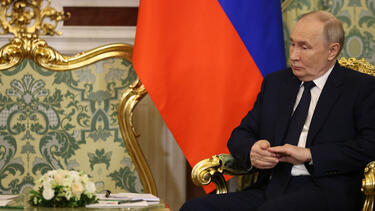Politics and Policy
The Problems with a Socialist Vision for NYC
Yale’s Jeffrey Sonnenfeld and co-authors suggest that some of New York City mayoral candidate Zohram Mamdani’s socialism-inspired proposals, such as city-owned grocery stores, are likely to run into inefficiencies and unanticipated downsides. They write that capitalism can be a better engine of progress.

A Partisan Mismatch with State Government Means Higher Borrowing Costs for Cities
Are red cities marooned in blue states—and blue cities in red states—at a financial disadvantage because of partisan politics? A new study co-authored by Yale SOM’s Anya Nakhmurina finds that cities whose leaders are from the opposite political party as their state governors are penalized in the bond market.
Donald Trump Has the Opportunity to End the Ukraine War
Yale SOM’s Jeffrey Sonnenfeld writes that with Russia’s economy teetering, the new president can push for an end to the war and even bring down the Putin regime.

Why CEOs Are Reaching Out to the New President
Yale SOM’s Jeffrey Sonnenfeld writes that business leaders are engaging with the new administration because they want to collaborate on areas of shared interest—and steer Trump away from ill-advised policies.

How Jimmy Carter Lost His Job and Found His Mission: A Personal Remembrance
Drawing on a decades-long relationship with Carter, Yale SOM leadership expert Jeffrey Sonnenfeld reflects on the vast achievements and sometimes bewildering contradictions in his post-presidency.

A Cheap Way to Change Lives
Yale SOM’s Dr. Howard Forman explains how the state of Connecticut is buying back the medical debt of thousands of low-income residents at cents on the dollar.

What Will the Return of Trump Mean for Connecticut’s Economy?
Professor Jeffrey Sonnenfeld and co-author Steven Tian write that the president-elect’s policies could have disruptive effects on some of the state’s most important industries, for better and for worse.

Is the Affordable Care Act on Life Support?
We talked to Yale SOM’s Dr. Howard Forman about what the ACA has achieved and what aspects of the law could be weakened under a Republican administration.

The Good, the Bad, and the Unpredictable in Trump’s Cabinet
Yale SOM’s Jeffrey Sonnenfeld and co-author Stephan Henriques write that some of the picks are reassuring, some seem designed to sow chaos, and some are wild cards, with the potential to tip the balance in either direction.

Anti-Business Sentiment Is Uniting Political Opposites
Yale SOM’s Jeffrey Sonnenfeld writes that populist voices on the left and right have found common ground in attacking big business.

How CEOs Should Navigate the Trump Presidency
Yale SOM leadership expert Jeffrey Sonnenfeld writes that business leaders should engage with the new administration—and remain unified on issues of shared concern.
